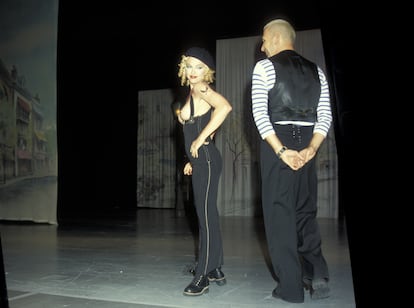Madonna has been scandalizing people for 40 years, and nobody’s going to stop her
The artist, who turns 64 today, celebrates four decades of her indomitable career with an album and her unconditional fight against overbearing morality
Madonna’s Instagram account has a reputation as a playground for digital voyeurs. It doesn’t disappoint, featuring Madonna crying; Madonna drunk; Madonna twerking with Maluma; Madonna filming her family performing a dance while cooking; Madonna kissing Britney Spears at Spears’s wedding; Madonna flashing a boob; Madonna posing spread-eagle with the caption, “I have something for you.”
The singer has relatively few followers (18.4 million) compared to stars from later generations like Beyoncé (273 million), but she offers better stimuli: the chance to see a pop star who has done everything – going above and beyond both morally and artistically – struggle not to become just another sympathetic character. Madonna has been part of the music world for 40 years and still no other pop star has proven to be more subversive and provocative than she is. Now, she’s releasing a remix album summarizing her career, Finally Enough Love: 50 Number Ones, turning 64 (August 16) and moving up the production of a film that tells her life story, the real one.

The singer’s frenzied use of Instagram perfectly symbolizes her career, which has been scrutinized around the world since she started in the music industry in 1982, at the age of 25. Surely, Madonna has suffered every type of harassment that a pop star can endure: sexual harassment, body criticism, machismo, classism; accusations of cultural appropriation and of being anti-religious, sacrilegious, unpatriotic, youth-obsessed; and claims that she’s a heretic, an imposter for using playback in concerts, the financier of an alleged sect (Kabbalah)... Yes, she’s always gone too far in everything; as a woman from the suburbs of Detroit, that has not been tolerated. In the 1980s, she burned crucifixes in her music video for Like a Prayer; in the 1990s, she published a book, Sex, that had the most explicit images of homosexuality and fetishism that a star had ever shown; in the 2000s, she passionately kissed Britney Spears at an awards gala with millions of people watching on television; and just recently on June 23, at a New York Pride celebration, she made out with her new friend, Tokisha, the 26-year-old Dominican woman we know from the songs she performs with Rosalía such as Linda and La Combi de Versace.

For a person who is so obsessed with attention, it must be frustrating for Madonna that she doesn’t resonate with today’s young people. Hence, her display with Tokisha and her desire to work with Kendrick Lamar, hip hop’s biggest talent today, as she confessed a week ago on Jimmy Fallon’s talk show. Madonna has one consolation: many teenagers today will also ignore the Beatles’ significance entirely, although Paul McCartney probably doesn’t care much about that anymore.
For 40 years, Madonna has been a thoughtful provocateur. Between provocations, she has recorded good albums with a limited voice. She herself has confessed that the biggest challenge of her career was preparing for the musical film Evita (1996); she had to work hard with the best singing coaches to bring her vocal abilities up to snuff. In four decades, she has released 14 albums, and at least five of them are essential listening. The first two (Madonna, 1983, and Like A Virgin, 1984) are full of gems that define 1980s dance pop. Songs like Holiday, Everybody, Lucky Star, Material Girl, Like a Virgin and Dress You Up are still exciting today, and they hold up equally well at the gym and in the club. Of course, Like a Prayer (1989), surely Madonna’s best work, transcends the context of the 1980s and has retained its appeal. In terms of lyrics, Ray of Light (1998) was one of her career’s best. Her great avant-garde electronica work with producer William Orbit is both relaxed and festive. Finally, her reinvention with Confessions on a Dance Floor (2005) – done in collaboration with Stuart Price – gave 1970s/early 1980s disco music a facelift by updating it and making it more sophisticated. Through the present day, Madonna has been enormously influential; her imprint on Dua Lipa is the clearest example. She always knew that fame comes through a musical pastiche: taking a bit from here and a bit from there without being too obvious and then embellishing it with her own contributions.

Madonna has sold 250 million records and is the best-selling female artist in history, not bad for a girl who was born in a Detroit suburb, and whose world was shattered when she lost her mother at six years of age. At the age of 20, she left for New York to do the opposite of what her strict father told her: she became a model and was soon performing nude at punk joints like CBGB’s. When she began to break through in music, she found herself in the spotlight and surrounded by male achievers, including Prince, Michael Jackson, Bruce Springsteen, Phil Collins, George Michael and U2. Of the 25 best-selling albums in the 1980s, when she began her career, only two women’s work made the cut: Madonna (with Like a Virgin and True Blue) and Whitney Houston.
In this male-dominated context, Madonna used her own sexualization to craft her image and exert control. She was not a sexual amusement for the male audience; she was a powerful and defiant woman. Madonna grew up listening to Stevie Wonder, Diana Ross and other Motown artists, learned to play the drums with Elvis Costello’s New Wave records, saw David Bowie at the first concert she attended, and had her first drink at the age of 30, following her divorce from actor Sean Penn. Restless and curious, she always sought the company of daring artists like Keith Haring and Jean-Michel Basquiat.

Soon, Madonna realized that she was living in a hostile environment that was not ready to tolerate an emancipated woman’s success. In 1985, Playboy and Penthouse magazines published nude photographs that had been taken of her in 1979, when the singer was not yet famous and made her living posing naked for photographers. The publications took advantage of the singer’s fame in the mid-1980s and sold the old images. Madonna took the incident as a warning. “That was the first time I was aware of saying ‘Fuck you’ with my attitude. You’re trying to put me down because of this? I’m not going to let public opinion dictate my own feelings about myself. I’m not going to apologize for anything I’ve done,” she told Rolling Stone magazine. In 2016, when Billboard magazine named her Woman of the Year, Madonna delivered a legendary speech against sexism, machismo and misogyny: “If you’re a girl, you have to play the game. You’re allowed to be pretty and cute and sexy. But don’t act too smart. Don’t have an opinion that’s out of line with the status quo. You are allowed to be objectified by men and dress like a slut, but don’t own your sluttiness.” She defiantly added that those who diminished her had made her tougher: “To the doubters and naysayers and everyone who gave me hell and said I could not, that I would not or I must not – your resistance made me stronger, made me push harder, made me the fighter that I am today. It made me the woman that I am today. So thank you.”
More than a pop star, Madonna is a concept. She stands for rebelliousness, indiscipline and fighting against the odds. That’s why she is an LGTBI muse and a point of reference for those who came after her: Britney Spears, Katy Perry, Christina Aguilera, Rihanna, Miley Cyrus, Taylor Swift, Pink... and the current pop goddess, Beyoncé, who recently released a version of her single Break My Soul fused with Madonna’s 1990 hit Vogue. Beyonce thanked Madonna for her example in a note that the latter shared on social media: “I’m so grateful for you. You have opened so many doors for so many women. You are a masterpiece genius.”
Emerging Spanish-language urban musicians also express their appreciation for Madonna. As the Argentine Ms Nina, who lives in Spain, put it: “She’s an inspirational empowered woman. Now, our lyrics scandalize people, but she was much more radical in the 1980s. People criticize her now because she has surgery, because she is old.... Let’s see how her critics are doing when they’re 60 years old. They’re never happy. But they’re not going to intimidate her. I love her.”

Indeed, no matter how many haters visit her Instagram, Madonna is not going to give up. In 2019, she released an album that passed muster with harsh critics. Madame X did not thrill people but she did convince them. “Oh, you’re not allowed to make youthful, fun, sexy music if you’re a certain age? That’s a load of bollocks, to speak your language,” she said in a 2019 interview with The Guardian about her recently released album. True to her commitment to the queer community, a few days ago she released Material Gworrllllllllllllll!, a collaboration with gay rapper Saucy Santana in which they remix her 1980s hit Material Girl.
Three weeks ago, the singer gave an interview to Variety, announcing that she will direct a movie about her life (Julia Garner will play her). She explained it this way: “It was also a preemptive strike because a lot of people were trying to make movies about me. Mostly misogynistic men. So I put my foot in the door and said, ‘No one’s going to tell my story, but me.’” As always, that’s just Madonna being Madonna.
Tu suscripción se está usando en otro dispositivo
¿Quieres añadir otro usuario a tu suscripción?
Si continúas leyendo en este dispositivo, no se podrá leer en el otro.
FlechaTu suscripción se está usando en otro dispositivo y solo puedes acceder a EL PAÍS desde un dispositivo a la vez.
Si quieres compartir tu cuenta, cambia tu suscripción a la modalidad Premium, así podrás añadir otro usuario. Cada uno accederá con su propia cuenta de email, lo que os permitirá personalizar vuestra experiencia en EL PAÍS.
¿Tienes una suscripción de empresa? Accede aquí para contratar más cuentas.
En el caso de no saber quién está usando tu cuenta, te recomendamos cambiar tu contraseña aquí.
Si decides continuar compartiendo tu cuenta, este mensaje se mostrará en tu dispositivo y en el de la otra persona que está usando tu cuenta de forma indefinida, afectando a tu experiencia de lectura. Puedes consultar aquí los términos y condiciones de la suscripción digital.









































